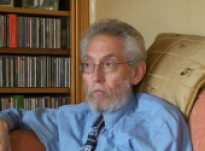Harvey - Interview 9

More about me...
Harvey feels his condition has been hard on his wife. After his colostomy he became impotent. He asked the hospital for support but was disappointed with their response.
Harvey feels his condition has been hard on his wife. After his colostomy he became impotent. He asked the hospital for support but was disappointed with their response.
Well they just, their answer is to give me tablets. In the first instance, they are okay, you know, Viagra. Okay. It seems to work, but not terribly well. So I went back and I said, “Who can I see?” And they sent me to the urology department, he gave me some different tablets. Well that wasn’t really dealing with the problem at all, because actually it was the same tablet, but a little bit stronger. It wasn’t addressing my needs at all. And then I went and saw the colorectal nurse and had a frank discussion with her, and she said, “Oh I’ll talk to a clinical psychologist.” And then she rang me and said, “Well he suggested, well rather than go to see a clinical psychologist we’d go to Relate.”
Harvey's teacher colleagues were unaware that he had Crohn's disease because he did not let it affect his work performance.
Harvey's teacher colleagues were unaware that he had Crohn's disease because he did not let it affect his work performance.
Harvey is disappointed that the doctors he has seen over the years are overly focused on medication. He would have liked some counselling for himself and his wife.
Harvey is disappointed that the doctors he has seen over the years are overly focused on medication. He would have liked some counselling for himself and his wife.
Harvey was diagnosed with bowel cancer despite being told by his GP years before that it was unlikely he'd ever get it.
Harvey was diagnosed with bowel cancer despite being told by his GP years before that it was unlikely he'd ever get it.
Harvey was diagnosed with Crohn's disease privately, after years of ill health.
Harvey was diagnosed with Crohn's disease privately, after years of ill health.
At first Harvey had many accidents with the stoma bag until he looked around for another type of stoma bag which worked better for him.
At first Harvey had many accidents with the stoma bag until he looked around for another type of stoma bag which worked better for him.
In Harvey's experience illness and Judaism seem to go hand in hand. But the thought that his illness might reside in his genes makes it somehow easier to deal with.
In Harvey's experience illness and Judaism seem to go hand in hand. But the thought that his illness might reside in his genes makes it somehow easier to deal with.
I suppose only in the sense that illness and Judaism seem to go together. You meet so many Jewish people who have so many health problems. It’s almost like if you’re Jewish you’re going to have health problems, you know, and yet I know a lot of Jewish people who are perfectly healthy and fit and well. But it does seem to me that a lot of Jewish people that I know do have health problems and some of the problems are quite major. It’s something you live with I think, because it’s almost a hereditary thing and within the genes it sometimes makes it a bit easier to deal with. You know, you are stuck with it. These are in your genes. Does that make sense?


